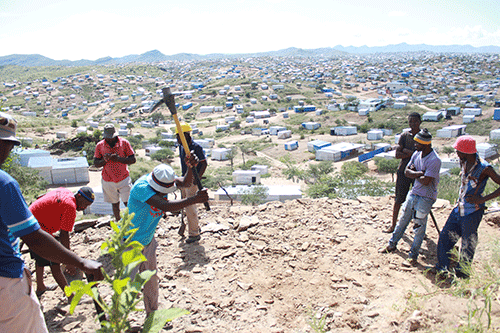A three-judge bench of the High Court dismantled land activist Dimbulukeni Nauyoma’s constitutionality challenge of the squatters’ proclamation law before throwing it out.
In their ruling, judges Boas Usiku, Collins Parker and George Coleman said Nauyoma’s application, particularly his founding papers (and every point raised), failed to be specific on what sections of the proclamation violate basic human rights, and which of those human rights were violated.
Furthermore, he failed to provide evidence that supports his application to have the Squatters Proclamation, AG 21 of 1985, declared unlawful.
Thus, it would be “unlawful and inequitable” to grant him the order he sought.
“It is never the burden of the court – particularly when the applicant is legally- represented – to trawl through all the basic human rights which Article 8 guarantees to see which one or which ones the applicant has approached the court to vindicate,” said the judges.
Furthermore, it is not enough for the applicant to approach the court and allege in general terms without evidence that his rights have been infringed, the bench found.
Speaking to New Era after the ruling, Nauyoma said the ruling is not a deterrence, and they will continue to fight for those oppressed.
“We came to court for the downtrodden, underprivileged and poor of society, who are faced with the law, a cloud that is hanging over their heads every day that they wake up. There is no sense of security of where they are supposed to live, or assurance whether they get to see another day,” charged the activist.
Nauyoma added: “Municipalities across the country utilise the period of winter to go and demolish poor people’s homes. You have also seen how those in authority abuse their power to make sure that the downtrodden and impoverished Namibians are at the receiving end of this squatter proclamation law.”
Nauyoma’s lawyer Kadhila Amoomo said they are not surprised by the outcome of the matter.
“We are not happy with the judgement. We are also not surprised because we participated in the hearing, and we saw from the sentiments of the judges where it was going,” he added.
Arguments
During oral arguments, Amoomo said the main purpose of the enactment of the squatters’ proclamation law by the apartheid government was to ensure that natives did not have access to land and housing in urban areas.
He said the same law still does not reflect the reality of the Namibian people.Land and housing are basic human needs. Thus, the erection of structures and occupation of land for purposes of housing as a basic need should not be criminalised, as it is currently done by the Squatters Proclamation.
According to Amoomo, Namibia should follow in South Africa’s footsteps and do away with such a law.
“South Africa came up with alternatives (Squatters Rights) to accommodate their citizens who are facing eviction or who cannot afford housing, unlike in Namibia. We believe that Namibia must do the same and declare the Act unconstitutional,” he continued.
He said the Act does not make provision for circumstances under which unlawful land occupiers obtained the land.
Furthermore, it does not take into account the period of time that a person may have occupied the land from which eviction is being sought.
Amoomo further highlighted that the Act does not make provision for special consideration of the rights of the elderly, children, disabled persons and homes that are headed by women – and it further does not make provision for an alternative dispute resolution surrounding the unlawful occupation of land.
In opposing the matter, the government was adamant that they are not defending the apartheid regime. Government attorney Dennis Khama said the proclamation serves a legitimate governmental objective of protecting property rights and prohibiting unnecessary land invasions, which could have a serious impact on the country’s economy.
He said it is necessary for a democratic state such as Namibia to ensure that property rights are protected, and the proclamation ensures that unlawful land invasions which violate the interests and rights of landowners are prohibited.
Khama submitted that if any unlawful entry to any land is not regulated by law, or if there is a vacuum in the law insofar as the protection of the rights of landowners is concerned, it may create social conflicts between landowners and those who occupied the land illegally.
– mamakali@nepc.com.na



